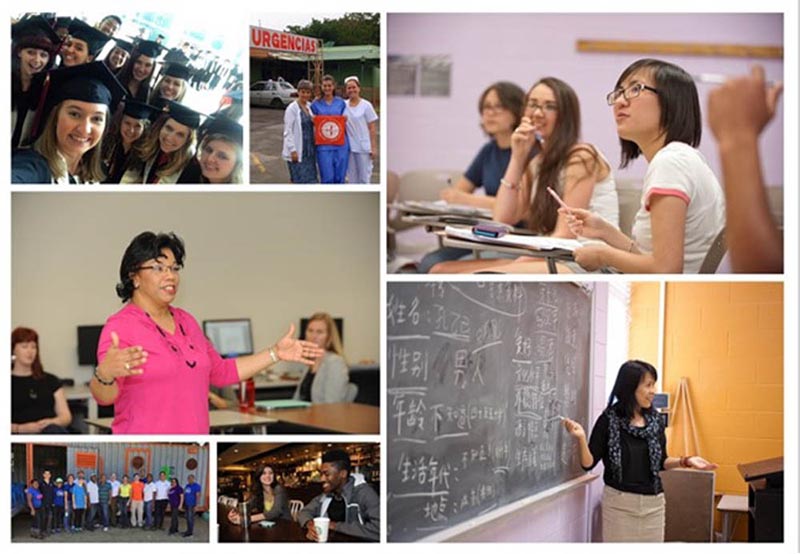Language and International Health, B.S.
Do you have a passion for language and a desire to serve? Do you want to make a difference in the lives of others? Do you understand that bilingual communication goes beyond a few signs posted on the wall? The need for bilingual health care providers has grown exponentially in recent years, not just in hospital settings and multicultural community centers but throughout the health care industry, which is why the Department of Languages and the Department of Public Health Sciences teamed up to offer the Bachelor of Science in Language and International Health.
This program pairs a modern language concentration (Chinese, French, or Spanish) with coursework in public health theory and practice. The language component emphasizes linguistic and cultural proficiency in the target language by studying specific peoples, cultures, literatures, technical language, health environments, and multicultural issues. The public health component includes the history and philosophy of public health and medicine; the organization, management, and financing of health services; the social and behavioral aspects of health, epidemiology, health evaluation methods, and health communications.
Graduates will be qualified to assume positions in a variety of settings, including integrated hospital systems, consulting firms, managed care organizations, pharmaceutical companies, as well as multicultural community centers. They can also pursue graduate degrees in community health, epidemiology/biostatistics, health administration, health systems, and research.
-
Why this program
- The need for bilingual health care providers is growing exponentially, not just in hospital settings and multicultural community centers but throughout the health care industry.
- Multilingual professionals are able to connect with non-English speaking patients in a more meaningful way, helping to provide a more comfortable experience and a better quality of care. Being able to provide care in a patient’s native language prioritizes patient safety, promotes a human connection, and improves outcomes.
- Bilingual healthcare professionals have access to a wider range of in-demand jobs than candidates who are fluent only in English.
- LI&H students enjoy an immersive language experience through an internship abroad in a healthcare setting where their target language is spoken.
- LI&H students work closely with faculty in both public health and languages.
-
What are the requirements for completing this degree?
This program is jointly administered by departments in two Clemson University colleges – the Department of Languages in the College of Architecture, Arts, and Humanities and the Department of Public Health Sciences in the College of Behavioral, Social, and Health Sciences – to offer an immersive education in both language and public health.
In public health classes, students study theory and practice, including the history and philosophy of public health and medicine; the organization, management and financing of health services; and the social and behavioral aspects of health, epidemiology, health evaluation methods and health communications. In language studies, students gain communicative competence in Chinese, French or Spanish and an understanding of the peoples, cultures, literatures, technical language, health environments and multicultural issues associated with your target language. Students choose an emphasis area in either Health Administration or Community Development.
All students spend a semester abroad in a country where their target language is spoken, where they take language-intensive courses and complete an internship in a health care setting. Internships are subject to approval by the Language and International Health Director.
In addition to the curriculum requirements, students are required, as a condition of graduation, to pass a noncredit language examination and submit a noncredit senior dossier to assess their language competence in various areas. Both assessments take place in the student’s last full semester at the University.
Students who have completed fewer than 50 credit hours may change majors into Language and International Health with a minimum cumulative grade-point average of 2.5. Students with 50 or more credit hours may apply for a change of major into Language and International Health, based on space availability, with a minimum cumulative grade-point average of 2.75.
-
How can I find more information?
This degree program is located in the Department of Languages located at 713 Strode Tower. For more information, contact:
Dr. Kelly Peebles
Director and Associate Professor
Department of Languages
Clemson University
713 Strode Tower
Clemson, SC 29634
kpeeble@clemson.edu
864-656-3393

